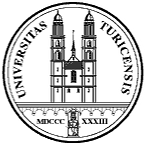University of Zurich
| University of Zurich | |
|---|---|
| Universität Zürich | |
 |
|
| Latin: Universitas Turicensis | |
| Established | 1833 (1525) |
| Type | Public University |
| Budget | 1.069 bn Swiss francs (US$1.03 bn) |
| President | Prof. Dr. Andreas Fischer |
| Academic staff | 7,170 (2008) |
| Undergraduates | 9,785 (2008) |
| Postgraduates | 5,093 (2008) |
| Location | Zurich, Canton of Zurich, Switzerland |
| Campus | Urban |
| Affiliations | LERU |
| Website | www.uzh.ch |
The University of Zurich (UZH, German: Universität Zürich), located in the city of Zurich, is the largest university in Switzerland, with over 25,000 students.[1] It was founded in 1833 from the existing colleges of theology, law, medicine and a new faculty of philosophy. Currently, the university has faculties of arts, economics, law, medicine, science, theology and veterinary medicine, offering the widest range of subjects and courses at any Swiss higher education institution.[2]
Contents |
History
The University of Zurich was founded on April 29, 1833[3], when the existing colleges of theology (founded by Huldrych Zwingli in 1525), law and medicine were merged together with a new faculty of Philosophy. It was the first university in Europe to be founded by the state rather than a monarch or church. The university allowed women to attend philosophy lectures from 1847, and admitted the first female doctoral student in 1866. The Faculty of Veterinary Medicine was added in 1901, the oldest such faculty in the world. In 1914, the university moved to new premises designed by the architect Karl Moser on Rämistrasse 71.[4]
Campus
The university is scattered all over the city of Zurich. There are several libraries available for use by members of the university, including Zurich Central Library, with over 5 million volumes.[5]
Museum
The Institute and Museum for the History of Medicine is part of the university.[6]
Academics
Faculties
Its best-performing faculties in terms of research quality are the Faculty of Economics, Faculty of Medicine and Faculty of Science, all of which rank in the top ten of Europe's universities. The University of Zurich as a whole also ranks in the top ten of Europe and in the top fifty worldwide. Notably in the fields of bioscience and finance, there is a close-knit collaboration between the University of Zurich and the ETH (Federal Institute for Technology, just across the road).
Rankings
- Newsweek global university ranking[7] (Based on research output, international staff/students and library holdings)
- 46th globally and 11th in Europe.
- Shanghai Jiao Tong University Ranking (heavy emphasis on research output - citations, nobel prizes etc.)
- 53rd globally and 12th in Europe.
- THES - QS World University Rankings[8] (heavy emphasis on peer review)
- 85th globally and 26th in Europe.
- Professional Ranking of World Universities [9] (Based on the number of alumni listed among CEOs in the 500 largest worldwide companies.)
- 32nd globally and 10th in Europe.
Language policy
Most courses are taught in Standard German ("Hochdeutsch"), but use of English is increasing in many faculties. In some highly competitive and international programs, such as the Master of Science in Quantitative Finance, all lectures are delivered in English.
Notable faculty
- Emil Theodor Kocher (Medicine 1909)
- Max von Laue (Physics 1914)
- Charles-Edouard Guillaume (Physics 1920)
- Walther Hermann Nernst (Chemistry 1920)
- Karl Landsteiner (Medicine 1930)
- Erwin Schrödinger (Physics 1933)
- Peter Debye (Chemistry 1936)
- Paul Karrer (Chemistry 1937)
- Lavoslav Stjepan Ružička (Chemistry 1939)
- Henrik Carl Peter Dam (Medicine 1943)
- Linus Pauling (Chemistry 1954; Peace 1962)
- George Wald (Medicine 1967)
- Hamilton O. Smith (Medicine 1978)
- Karl Alex Müller (Physics 1987)
- Eric F. Wieschaus (Medicine 1995)
- Rolf M. Zinkernagel (Medicine 1996)
Notable fellows of the university
- Rolf Pfeifer- Artificial Intelligence Lab, IFI
Student life
The university's Academic Sports Association (ASVZ) offers a wide range of sports facilities to students of the university.
Alumni
Alumni of the University of Zurich include 6 Nobel Prize laureates.[10]
| Year | Field | Laureate |
|---|---|---|
| 1901 | Physics | Wilhelm Conrad Röntgen |
| 1902 | Literature | Theodor Mommsen |
| 1913 | Chemistry | Alfred Werner |
| 1921 | Physics | Albert Einstein |
| 1937 | Chemistry | Paul Karrer |
| 1949 | Medicine | Walter Rudolf Hess |
See also
- myScience.ch - The Swiss Portal for Research and Innovation
References
- ↑ "Studierende an den universitären Hochschulen: Basistabellen" (xls). Bundesamt für Statistik BFS. 2008. http://www.bfs.admin.ch/bfs/portal/de/index/themen/15/06/data.Document.80560.xls. Retrieved 2008-04-18.
- ↑ "Profile: At a glance". University of Zurich. 2008. http://www.uzh.ch/about/portrait/portrait_en.html. Retrieved 2008-04-26.
- ↑ "Dies academicus". University of Zurich. August 5, 2009. http://www.uzh.ch/about/portrait/dies_en.html. Retrieved January 31, 2010.
- ↑ Ganz, Michael T.; Stucki, Heinzpeter (2008), History in brief, University of Zurich, http://www.uzh.ch/about/portrait/history_en.html, retrieved January 31, 2010
- ↑ University of Zurich (April 4). Stadt Zürich [map], 1:1000. Retrieved January 31, 2010.
- ↑ Website of the Institute and Museum for the History of Medicine, University of Zurich
- ↑ "The Top 100 Global Universities". Newsweek. August 13, 2006. http://www.msnbc.msn.com/id/14321230/print/1/displaymode/1098/. Retrieved January 31, 2010.
- ↑ "THE - QS World University Rankings 2009 - top universities". Times Higher Education-QS World University Rankings. http://www.topuniversities.com/university-rankings/world-university-rankings/2009/results. Retrieved January 31, 2010.
- ↑ "The 377 leading higher education institutions in 2009". INTERNATIONAL PROFESSIONAL RANKING of HIGHER EDUCATION INSTITUTIONS. Mines ParisTech. 2008. http://www.ensmp.fr/Actualites/PR/EMP-ranking.html#7. Retrieved January 31, 2010.
- ↑ "Nobel Prize laureates". University of Zurich. July 20, 2009. http://www.uzh.ch/about/portrait/nobelprize_en.html#2. Retrieved January 31, 2010.
External links
- Information for prospective students
- Official homepage (German)
- Official homepage in English
- About the university (in German)
- About the University (in English)
- Union of students' associations of the University of Zurich
- information about the University of Zurich
- The Ranking Forum of Swiss Universities
|
|||||